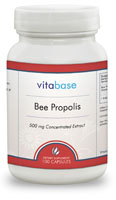| Bee propolis is the resinous substance collected by bees from the leaf buds and bark of trees, especially poplar and conifer trees. It is present on the inner surface of beehive alveoli. Propolis is composed of a variety of primary plant-derived pollens, waxes, oils,
resins, polyphenols, and flavonoids. It is used by bees as a glue or cement in their hives. They also enclose or encapsulate things that bother them such as menthol bags placed by the beekeeper inside the hive. It is sticky in warm weather and brittle in cold weather.
Since ancient times propolis has been used as a folk remedy in different areas of the world because of its potential antimicrobial and soothing and demulcent activities. Propolis has been found to exhibit a variety of pharmacological effects on the human body. Among such effects are anti-microbial effects, anti-viral effects, anti-oxidative effects, anti-inflammetory effects, antitumor effects, local anasthetic effects, analgestic effects, and immuno-stimulating effects. Propolis which has been known as a natural antimicrobial substance or a health-improving substance is a composition containing secondary metabolites typified by flavonoids and phenols produced by phanerogams such as aspen and pine trees and collected by arthropods such as honeybees in wax and salivary juice which are produced by the arthropods. Propolis extracts may be helpful in protecting against and shortening the duration of the common cold. The antimicrobial properties of propolis may also help protect against parasitic infections in the gastrointestinal tract.
Intact bee propolis contains a variety of trace ingredients in the form of a homogenous mixture with resins, beeswax, essential oils and pollens as predominant ingredients. Propolis has approximately 50 constituents, primarily resins and vegetable balsams (50%), waxes (30%), essential oils (10%), and pollen (5%). Propolis is used by music instrument makers to better show the wood grain. It is a component of Italian varnish and was reportedly used by Stradivari. Intact propolis is not useful in food products because it generally contains large amounts of contaminants and is barely soluble in water. Thus, propolis is generally used as a propolis extract in the form of liquid (propolis tincture) which is prepared by extracting a crude propolis specimen with a relatively-high concentration solution of a readily water-soluble organic solvent such as ethanol. |
 Propolis is packed with nutrients. It contains all the vitamins except for Vitamin K. It also contains bioflavonoids, calcium, magnesium, iron, and zinc. In all, scientists have identified more than 180 compounds in propolis. Propolis has been found to be active against bacteria, viruses, and other micro-organisms. The flavonoids in propolis are powerful antioxidants. They help account, in part, for propolis' antibiotic and antiviral properties. Antioxidants help eliminate damaging free radicals from the body. Propolis is also believed to have some anti-inflammatory properties. Click here for more information.
Propolis is packed with nutrients. It contains all the vitamins except for Vitamin K. It also contains bioflavonoids, calcium, magnesium, iron, and zinc. In all, scientists have identified more than 180 compounds in propolis. Propolis has been found to be active against bacteria, viruses, and other micro-organisms. The flavonoids in propolis are powerful antioxidants. They help account, in part, for propolis' antibiotic and antiviral properties. Antioxidants help eliminate damaging free radicals from the body. Propolis is also believed to have some anti-inflammatory properties. Click here for more information.